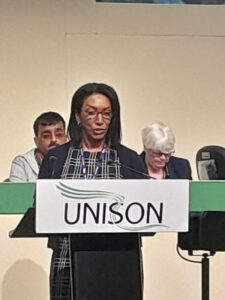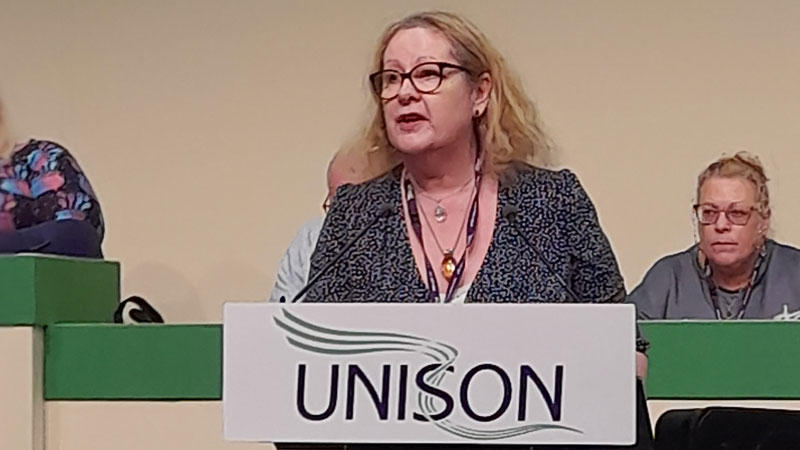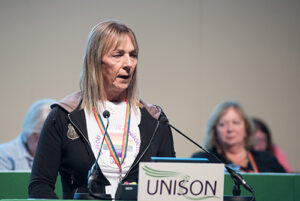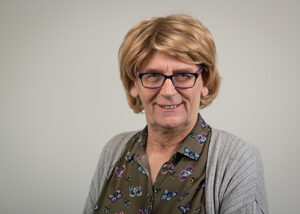Delegates at this year’s disabled members conference yesterday debated a range of issues that affect their members.
The motion ‘mind the pay gap’ noted that, even for those disabled people in work, the disability pay gap is growing and now stands at a shocking 17.2% or £3,700 less a year than non-disabled workers.
Looking also at the pay gaps across other equality strands, the motion notes that since gender pay gap reporting has been required, for organisations with more than 250 employees, there has been an improvement – from 18.4% in 2017 down to 14.9% in 2022.
And it states: “It is becoming clear that, until organisations are held to account, they will not take responsibility and they will not take action.”
Pay gap ‘an issue across all identities’
Lucy Power from the Kent Police and Justice branch (pictured above) introduced the motion on behalf of the disabled LGBT+ committee.
She told delegates: “The pay gap is an issue across all identities. As a woman, you’re more than likely to be impacted by the gender pay gap. Add disability into that mix, and then, for good measure, chuck in race and gender identity or sexual orientation. What started as a single impact has started impacting doubly, triply, quadruply.
“The fact is that these other pay gaps exist because no one is looking. Since gender pay gap reporting was introduced it has decreased, while other pay gaps appear to be increasing. It is time to act.”
She said that for employers to report pay gaps, they had to know their workforce. “And they can’t know their workforce if their workforce doesn’t trust them enough to declare their particular protected characteristic.”
Workers are often reluctant to declare protected characteristics due to stigma, and the perceived detrimental effect on promotion or workplace development.
This particularly affects disabled workers, and especially LGBT+ workers who may not be ‘out’ at work. In many sectors, workers have no confidence that their employer will handle that data with appropriate security and regard.
Delegates called on the disabled members committee to follow an effectively two-pronged approach:
- Working with organisations on safeguarding their workers’ data, to instil confidence in reporting disability and other equality related data
- Campaign for the mandatory annual reporting by all employers with over 250 employees, of the numbers of disabled, LGBT+, and black workers employed, at what levels, and the pay gaps associated with each of those characteristics.
Ms Power concluded: “Conference, we believe the pay gap issue is one that can be tackled and must be tackled. And if this government won’t act, we must encourage our organisations to take the lead.”
National care service
Delegates also passed a motion on developing UNISON’s vision of a national care service, which reasserted the belief that all social care should be provided as a funded, universal service that is free at the point of delivery service and works in the interests of all.
This would mean an end to private companies making profit out of care, and a commitment to deliver care services primarily through local government. Fair work, decent pay and improved status should be the norm for all care workers.

Moving the motion, Denise Thomas of the national disabled members committee (pictured above) told delegates: “Time and time again we see the money for social care being syphoned out of the care sector to faceless corporations and shareholders. Social care is being asset stripped and people with disabilities, care workers and the most vulnerable in our society are paying the price.
“In a world where demographics are shifting, where the elderly and disabled population is growing, our current approach to care is unsustainable.”
Ms Thomas said that UNISON’s vision for a national care service would “revolutionise the way we approach care in our nation.” For disabled people, this would mean greater access to care, including medical and non-medical assistance, personalised care plans, and empowerment – to live more independently, participate in their communities and have a stronger voice in decisions affecting their lives.
Sean Fox, of Haringey local government branch agreed. “A national care service is not just a badge,” he said. “We need a publicly owned and properly funded care service.”
Health and disability white paper
A motion on the government’s health and disability white paper, which was published in March this year, called it “an attack on disabled people’s income and independence”.
The government claims the new set of policies related to welfare benefits will help more disabled people and people with health conditions to start, stay and succeed in work.
However, delegates agreed that the opposite is true and that the key changes will push disabled people further into financial hardship, at a time when they are already experiencing the sharp end of the cost of living scandal.
For example, the introduction of personal independence payments (PIP) – adult disability payments in Scotland – as the qualifier to exempt people from looking for work “is just a ploy to force more disabled people into work whether or not they are ready for it, and to pay them less money in universal credit,” the motion said.

Moving the motion for the national disabled members’ committee, Sonya Howard (pictured above) observed: “We live in a society that has negative assumptions about disabled people and we need to change this false narrative, to gain both political and social progress that is long overdue.”
In passing the motion, delegates charged the committee to:
- Widely publicise the proposed changes to the benefits system and their potential negative impact on disabled people’s income and independence.
- Work through UNISON Labour Link to lobby the Labour Party to develop a realistic and supportive plan to reform the welfare benefits system, so that it puts the needs and independence of disabled people at its heart.
Among other subjects discussed during a wide-ranging conference was a motion that noted the “huge lack of understanding” about neurodiversity in society, particularly in relation to women.
The disabled members committee is to consider working with neurodiverse members to develop guidance on neurodiversity in the workplace, which includes specific reference to the challenges faced by women workers with neurodiverse conditions.
The article ‘Pay gaps exist because no one is looking,’ disabled members hear first appeared on the UNISON National site.

